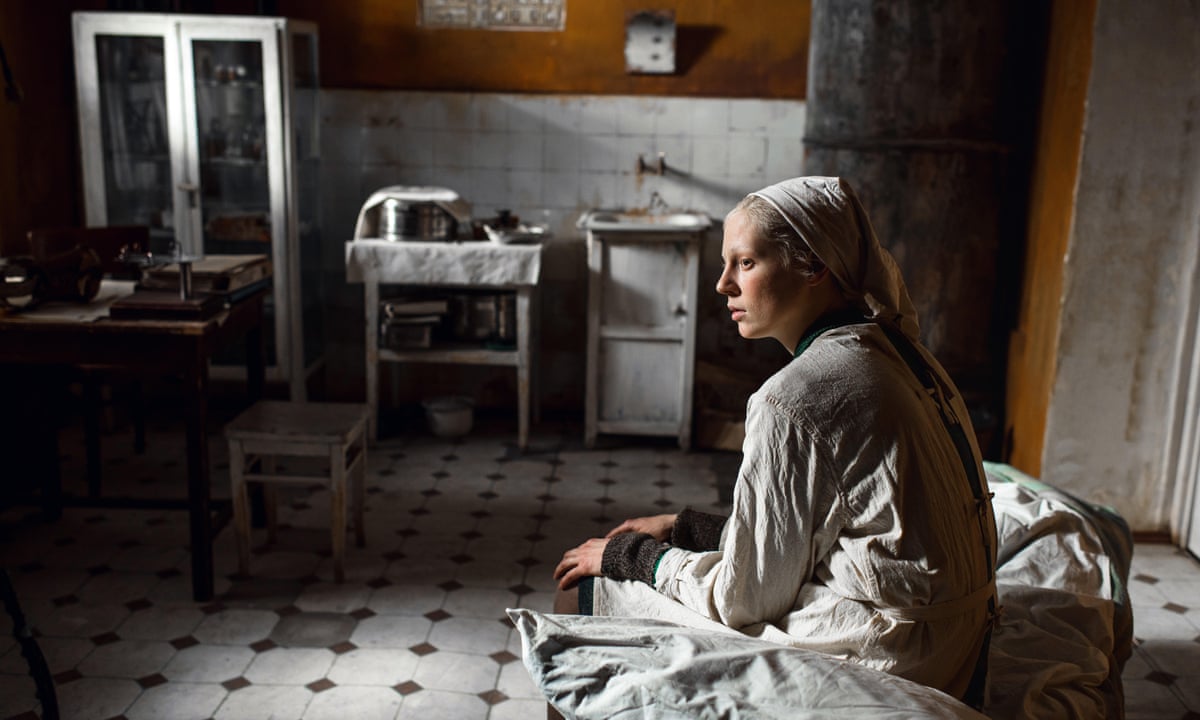Awash in stunning shades of green and red, Kantemir Balagov’s magnificent second directorial venture Beanpole is an intimate portrayal of post-war life in Russia. Set in Leningrad soon after the end of WWII, this Russian film centers the experiences of two women as they struggle to re-adjust to a life of normalcy in the aftermath of widespread death and destruction. Iya Sergueeva (played exceptionally by Viktoria Miroshnichenko) is fondly called Beanpole as a result of her towering form; tall and lanky. Beanpole works as a nurse in a government hospital under Dr. Nikolay Ivanovich (Andrey Bykov) while also caring for her friend’s son while she’s away at war.
Iya Sergueeva (played exceptionally by Viktoria Miroshnichenko) is fondly called Beanpole as a result of her towering form; tall and lanky. Beanpole works as a nurse in a government hospital under Dr. Nikolay Ivanovich (Andrey Bykov) while also caring for her friend’s son while she’s away at war.
While Iya diligently tends to soldiers battered and bruised by the war, she lives with a condition of her own – prone to PTSD episodes, Iya freezes up, immobile, at frequent intervals without any control over her actions. Formerly on the warfront, Iya’s PTSD leads to her discharge, but while she’s managed to leave the war behind, its insidious hold on her life lingers with devastating effects. An unforeseen tragedy turns Beanpole’s quiet, communal life upside down. The return of her friend Masha (played by Vasilisa Perelygina) from war takes the narrative forward as we witness both women make sense of a ruined world around them while trying to negotiate their own identities.

The narrative prioritises the female experience during war
Balagov’s decision to center a war drama on the lives of two women in Beanpole, far from the warfront and away from men who usually monopolise this genre of storytelling, makes for an exquisite piece of cinema that examines the permanence of war in the lives of women. Iya and Masha, despite their contrasting personalities, find a strange kind of solace in each other’s company amid unspeakable loss. The journey of their friendship is unconventional and often startling in its intensity, but it arises from a shared understanding. An understanding that they have wasted their youth partaking in bloodshed and their future now remains permanently tainted.
The tragedy in the lives of these women is constant and oppressive but their ability to persevere and find some semblance of meaning is what Balagov places at the heart of Beanpole. There are no guns, no battlefields that we see on-screen, there is no overt suggestion of war but simply the whisper of it. The kind of whisper that is constant and nagging, a whisper that defines the lives of Iya and Masha. The characters that inhabit Beanpole embody a pervasive melancholy that accompanies the inevitable realisation that the peace promised after war will always remain unattainable. There’s a lot that goes unsaid in Beanpole, replaced instead by striking visuals that perfectly relay the constant conflict and inner turmoil these characters are put through.
Also read: Film Review: ‘Bulbul Can Sing’ Is A Story Of Hope From Rural Assam
The men in Beanpole are conspicuously on the periphery, brought to the forefront only when Iya and Masha deem relevant. A quiet devastation lingers in every frame of Beanpole and Balagov is always mindful of the complex dynamics between these women and how it informs their relationship with each other and everyone around them.
As a war narrative, Beanpole is compelling from start to finish because of its distinct storytelling, magnificent cinematography and stellar performances by its lead cast. There is an uncompromising clarity in Balagov’s vision of a post-war Russia and the place it has for women. Despite their circumstances, Iya and Masha have learned to adapt, to find ways that ensure survival. Beanpole isn’t just a critique of the mindlessness of war but also an examination of the lives of the people left behind, who now have to tend to a crumbling world they are unwillingly a part of.
Iya and Masha occupy the roles of caregivers in Beanpole, a traditional gender role, but Balagov subverts the audience’s expectation by charting out their paths in such contrasting ways that we are forced to re-examine our own internalised biases and the ways in which we expect narratives based on women to eventually pan out.
Iya and Masha occupy the roles of caregivers in Beanpole, a traditional gender role, but Balagov subverts the audience’s expectation by charting out their paths in such contrasting ways that we are forced to re-examine our own internalised biases and the ways in which we expect narratives based on women to eventually pan out. Beanpole is at once tragic, devastating, and poignant because of its singular focus on its two unrelenting female protagonists who are on the precipice of a life that greets them with a new tragedy far too frequently. Watching Beanpole is a transfixing, challenging experience that is consistently rewarding. The film handles its protagonists and their journey with a delicate grace, offering us a unique feminist piece of cinema that is unmissable.
Also read: Enola Holmes Review: The Damsel Who Distressed The Patriarchy
Featured Image Source: NYTimes.com
About the author(s)
Raavya is a pop-culture nerd who lives and breathes books and cinema. An unrelenting feminist, she hopes to change regressive mindsets through the written word. She can be found on Twitter and Instagram.




